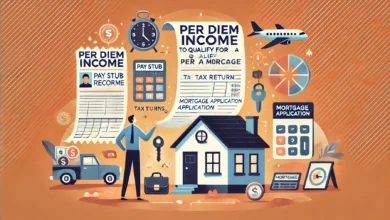Which Lender Should Haven Choose for Her Mortgage and Why?

Finding the right mortgage lender can feel overwhelming, especially with the wide range of options available today. Each lender comes with its own set of benefits and potential drawbacks, making the decision a critical one for anyone looking to finance their home. But how should someone like Haven decide on a mortgage lender? Let’s break down the different options and key factors to consider when making this significant financial decision.
Understanding the Types of Mortgage Lenders
When considering a mortgage, Haven needs to understand the various types of lenders she might encounter. Each type has different offerings, and some may be better suited to her needs than others. Let’s explore the main options:
1. Banks and Direct Lenders
Banks, especially larger national banks, are some of the most common sources for mortgage loans. Direct lenders, such as specialized mortgage companies, fall under this category. They offer traditional loan products, including fixed-rate and adjustable-rate mortgages.
- Pros: Convenience is a significant advantage. Haven can handle multiple financial needs (checking, savings, and mortgage) in one place. Additionally, banks and direct lenders often provide streamlined application processes and, sometimes, pre-approval within hours.
- Cons: These lenders may have more stringent requirements regarding credit score and income. Furthermore, interest rates might be higher than those offered by other types of lenders due to the variety of fees involved.
2. Credit Unions
Credit unions are member-owned financial cooperatives, and they often have a more community-focused approach to lending. Because they’re non-profit, they may offer lower fees and more favorable interest rates to members.
- Pros: One key advantage is the potential for lower interest rates and fees compared to traditional banks. Credit unions may also provide more personalized customer service, as they aim to serve their members’ best interests.
- Cons: However, not everyone can join any credit union, as many have eligibility requirements based on location, occupation, or affiliation with certain organizations. Additionally, the range of loan products may be more limited than what larger banks offer.
3. Online Lenders
Online mortgage lenders have gained popularity for their user-friendly and efficient loan application processes. Companies like Rocket Mortgage and Better.com offer fully digital experiences that can make the mortgage process quicker and more transparent.
- Pros: Online lenders often offer competitive rates, and their platforms are designed for quick comparisons and easy applications. They can also provide instant pre-approval and help Haven track her application status in real-time.
- Cons: The lack of in-person service may be a drawback for Haven if she prefers face-to-face communication. Additionally, some online lenders may be less flexible when it comes to unique financial situations or needs.
4. Mortgage Brokers
Mortgage brokers act as intermediaries between borrowers and lenders. Instead of applying directly to one lender, Haven could use a broker to find and compare mortgage options from multiple lenders, potentially saving time and effort.
- Pros: A mortgage broker can often access a broader range of lenders, including some that Haven might not find on her own. This flexibility can be beneficial if she has a non-traditional financial situation or if she is seeking the best possible interest rate.
- Cons: Brokers often charge a fee for their services, either as a percentage of the loan or through additional fees from lenders. It’s crucial to weigh these costs against the benefits of using a broker.
Key Factors to Consider When Choosing a Lender
Haven needs to consider several key factors to find the lender that best fits her situation. Here’s a breakdown of the most important considerations:
1. Interest Rates and Loan Terms
Interest rates significantly impact the total cost of the mortgage. Haven should compare rates from multiple lenders, keeping in mind that even a small difference in the rate can result in substantial savings over the life of the loan. Additionally, understanding the loan term (15-year vs. 30-year mortgage) is crucial, as shorter terms often mean higher monthly payments but lower interest costs overall.
2. Lender Reputation and Customer Service
It’s important for Haven to research lender reviews and customer feedback. A lender’s reputation can speak volumes about its reliability and supportiveness throughout the mortgage process. Strong customer service can make a stressful process more manageable, especially when it comes to timely communication and answering questions.
3. Fees and Closing Costs
Beyond the interest rate, Haven needs to be aware of other costs associated with a mortgage, such as origination fees, appraisal fees, and closing costs. Some lenders might offer a lower interest rate but compensate with higher fees. It’s essential to request a Loan Estimate from each lender to see the full breakdown of costs.
4. Pre-Approval Process and Loan Speed
For Haven, getting pre-approved is an essential step in the mortgage process. A quick and smooth pre-approval process can give her an advantage when making offers on homes, as sellers often prefer buyers who are already pre-approved. Additionally, the speed at which the lender can close the loan might be a factor if Haven needs to move quickly.
5. Flexibility and Special Programs
Some lenders may offer special programs, such as loans with low down payment requirements, first-time homebuyer assistance, or flexible underwriting for unique financial situations. If Haven qualifies for any of these programs, they could significantly impact the type of lender she chooses and the terms of her mortgage.
Comparing Lenders Based on Haven’s Needs
Now, to address the key question: Which lender should Haven choose for her mortgage and why?
Haven’s choice will ultimately depend on her specific financial situation, priorities, and preferences. Below are a few scenarios and the type of lender that might best fit each:
- Scenario 1: Haven Has an Excellent Credit Score and Steady Income If Haven has a strong credit profile and a stable income, she might benefit from the competitive rates offered by banks or direct lenders. In this case, she can leverage her good financial standing to secure favorable terms and quick approval.
- Scenario 2: Haven Wants Lower Fees and a Community-Based Experience For those who prefer a personalized touch and potentially lower fees, credit unions might be the better option. If Haven is eligible to join a credit union, she could enjoy more favorable terms and better customer service.
- Scenario 3: Haven Prefers a Fully Digital Experience If Haven values convenience, speed, and the ability to handle everything online, then online lenders could be the way to go. The straightforward, paperless application process and real-time status updates make online lenders an appealing choice for tech-savvy borrowers.
- Scenario 4: Haven Needs More Options and Tailored Solutions If Haven’s financial situation is more complex (for example, self-employment or low credit score), working with a mortgage broker might be advantageous. A broker can match Haven with a lender that best meets her needs, even if it means paying a broker fee.
Recommendations Based on Haven’s Situation
Here are three potential lenders Haven might consider based on her needs:
- Chase Bank: For borrowers seeking a traditional lender with a variety of mortgage products, Chase offers competitive fixed-rate mortgages and excellent customer support. They also provide in-person assistance, which might be a priority for Haven if she prefers face-to-face interaction.
- Rocket Mortgage: If Haven values convenience and speed, Rocket Mortgage’s digital-first approach could be ideal. They are known for quick pre-approvals and competitive rates, making them a good option for tech-savvy borrowers.
- Navy Federal Credit Union: If Haven has access to this credit union (through military affiliation), it could be an excellent choice for low-interest rates and personalized service. Credit unions often offer more borrower-friendly terms.
Final Thoughts: Which Lender Should Haven Choose for Her Mortgage and Why?
Deciding on a mortgage lender is a highly individualized process, and the right choice depends on Haven’s specific needs and financial goals. It’s crucial to compare different lenders based on interest rates, fees, customer service, and any unique circumstances that might influence the decision. By understanding the advantages and drawbacks of each lender type and considering the key factors outlined, Haven can make an informed choice that aligns with her long-term plans and budget.
Sources:
NerdWallet
Bankrate
Rocket Mortgage
The Mortgage Reports
U.S. News & World Report



